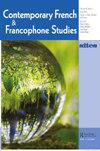Encounters: France, Islam, and the Secular Order
IF 0.2
4区 文学
0 LITERATURE, ROMANCE
引用次数: 0
Abstract
The articles in this volume critique the representational systems radically demarcating “Islam” and “France”; mutually, the pieces aim at a “recognition” [Anerkennen] of the innate capacity of the subjects implicated in the dialectic of French exceptionalism to free themselves from static particularity and share in the concrete dynamism of ethical life. Our collection opens with a vigorous challenge to the premise of this volume. Questioning from the outset the terms of the debate on the relation of Islam and secularism in France, Elisabeth Roudinesco, in a spirited exchange with Christine Fizser, rejects the notion that particularity in all its forms—including “ostentatious” religious signs—can be taken as a basis for universality. True enough, abstract conceptions of citizenship and universality must find particular and concrete expression: the uniqueness of “French” “laicit e,” after all, necessarily consists in its historical specificity. Its inherited forms, moreover, cannot easily be displaced or preserved intact: they resist and remain subjects of performative resignification. Acknowledging and giving primacy to the given forms of the secular order, Roudinesco argues that the discourse on and expressions of Islam in France must be engaged in the unique context of the “French exception.” She thus rejects new terms from the left like “Islamophobia” in favor of more normative concepts like “racism” and those from the right like “Islamogauchisme” in favor of the traditional defense of free intellectual exchange. It could be asked whether there is a false equivalence here: “Islamophobia” refers to a well-documented phenomenon in France, while “Islamogauchisme,” many argue, names a non-existent conspiracy. At the same time, the latter term marks a quintessential articulation of the universalist order. Critical analysis reveals the term’s performative function: to conjure and stoke fear of a racialized specter in the service of the autochthonous tendencies Roudinesco clearly despises. “Islamo-gauchisme” in this respect exposes the ironic structure and thus dialectical instability of the universalist concepts of French secularism and, moreover, instantiates their perversion in the service of hegemony. Given the rising tide of ethnonationalism in France, we view the deconstruction of “Islamo-gauchisme” and other such terms as an increasingly urgent task. We further defend, with Hegel, the aesthetic modality through which universality—a fundamentally revolutionary impetus in its Islamic and French forms—can find recognitive expression on earth: for freedom must emerge邂逅:法国、伊斯兰教和世俗秩序
本卷的文章批判了从根本上划分“伊斯兰”和“法国”的代表体系;相互而言,这些作品旨在“承认”法国例外主义辩证法中所涉及的主体的内在能力,使其摆脱静态的特殊性,分享道德生活的具体活力。我们的收藏以对本卷前提的有力挑战而开始。Elisabeth Roudinesco从一开始就质疑法国伊斯兰教与世俗主义关系的辩论条件,在与Christine Fizser的激烈交流中,她拒绝接受所有形式的特殊性——包括“炫耀性”宗教标志——都可以被视为普世性的基础的观点。诚然,公民身份和普遍性的抽象概念必须找到特定而具体的表达:毕竟,“法语”“laicite”的独特性必然在于其历史的特殊性。此外,它的继承形式不能轻易地被取代或原封不动地保留下来:它们抵抗并仍然是表演性辞职的主体。Roudinesco承认并优先考虑世俗秩序的特定形式,他认为法国对伊斯兰教的讨论和表达必须在“法国例外”的独特背景下进行。因此,她拒绝接受左翼的新术语,如“伊斯兰恐惧症”,支持“种族主义”等更规范的概念,也拒绝接受右翼的新术语(如“伊斯兰国”),支持传统的知识自由交流辩护。人们可能会问,这里是否存在虚假的对等:“伊斯兰恐惧症”指的是法国一种有据可查的现象,而许多人认为,“伊斯兰恐惧”则指的是一个不存在的阴谋。同时,后一个术语标志着普遍主义秩序的典型表达。批判性分析揭示了这个词的表演功能:唤起和煽动对种族化幽灵的恐惧,为鲁丁斯科明显鄙视的本土倾向服务。在这方面,《高奇斯梅岛》揭露了法国世俗主义普遍主义概念的讽刺结构和辩证不稳定性,并体现了它们为霸权服务的变态。鉴于法国民族主义的兴起,我们认为解构“高奇斯梅岛”等术语是一项越来越紧迫的任务。我们与黑格尔一起进一步捍卫了一种美学模式,通过这种模式,普遍性——伊斯兰和法国形式的根本革命性推动力——可以在地球上找到公认的表达:因为自由必须出现
本文章由计算机程序翻译,如有差异,请以英文原文为准。
求助全文
约1分钟内获得全文
求助全文
来源期刊

Contemporary French and Francophone Studies
LITERATURE, ROMANCE-
CiteScore
0.30
自引率
0.00%
发文量
43
期刊介绍:
An established journal of reference inviting all critical approaches on the latest debates and issues in the field, Contemporary French & Francophone Studies (formerly known as SITES) provides a forum not only for academics, but for novelists, poets, artists, journalists, and filmmakers as well. In addition to its focus on French and Francophone studies, one of the journal"s primary objectives is to reflect the interdisciplinary direction taken by the field and by the humanities and the arts in general. CF&FS is published five times per year, with four issues devoted to particular themes, and a fifth issue, “The Open Issue” welcoming non-thematic contributions.
 求助内容:
求助内容: 应助结果提醒方式:
应助结果提醒方式:


